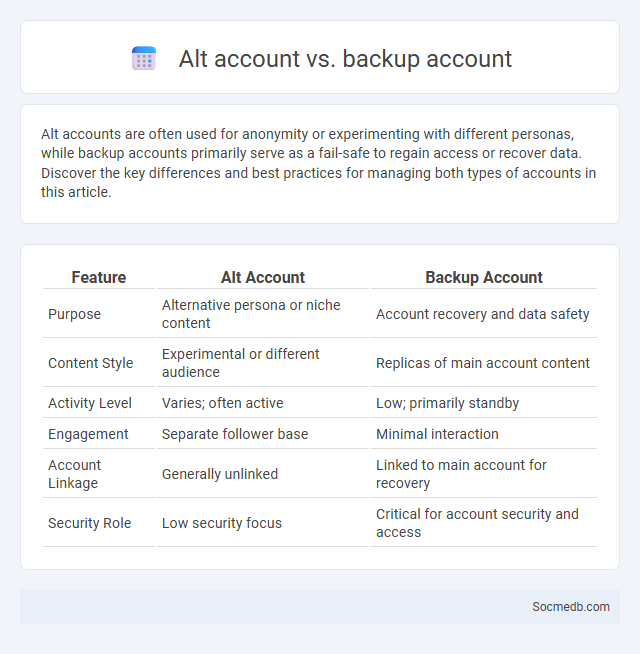
Photo illustration: Alt account vs Backup account
Alt accounts are often used for anonymity or experimenting with different personas, while backup accounts primarily serve as a fail-safe to regain access or recover data. Discover the key differences and best practices for managing both types of accounts in this article.
Table of Comparison
| Feature | Alt Account | Backup Account |
|---|---|---|
| Purpose | Alternative persona or niche content | Account recovery and data safety |
| Content Style | Experimental or different audience | Replicas of main account content |
| Activity Level | Varies; often active | Low; primarily standby |
| Engagement | Separate follower base | Minimal interaction |
| Account Linkage | Generally unlinked | Linked to main account for recovery |
| Security Role | Low security focus | Critical for account security and access |
Introduction to Online Account Types
Online account types encompass social media profiles, email accounts, and cloud storage services, each designed to facilitate communication, content sharing, and data management. Social media platforms like Facebook, Twitter, and Instagram offer user accounts that enable networking, advertising, and content creation capabilities. Understanding the distinct features of these accounts helps optimize digital presence and secure personal information in an interconnected online environment.
Defining Alt Account: Purpose and Use Cases
An alt account, or alternative account, serves various purposes such as maintaining privacy, experimenting with content, or managing multiple online personas across social media platforms. Users often create alt accounts to separate professional and personal interactions, explore niche interests, or engage with communities without revealing their primary identity. Your understanding of alt accounts can enhance online security and allow strategic content sharing tailored to different audiences.
What is a Backup Account? Key Features
A backup account on social media serves as a secondary profile that protects your online presence in case your primary account is compromised or inaccessible. Key features include account recovery options, alternative contact information, and the ability to maintain connections and content continuity. Your backup account ensures uninterrupted access to your social network while providing an extra layer of security and control.
Comparing Alt Accounts and Backup Accounts
Alt accounts serve primarily to provide anonymity and explore different personas on social media platforms, often allowing users to interact without impacting their main profile's reputation. Backup accounts function as a safety net, preserving user access and data continuity in case the primary account is compromised or suspended. Both types enhance user control and privacy but differ in purpose: alt accounts offer experimental freedom, whereas backup accounts ensure account recovery and security.
Common Reasons for Creating Multiple Accounts
Common reasons for creating multiple social media accounts include separating personal life from professional activities, managing different brands or projects, and maintaining privacy by limiting the visibility of certain content. Users often seek to target diverse audiences or test various strategies without compromising their main account's credibility. Managing multiple accounts allows better content customization and enhances user engagement across platforms like Instagram, Facebook, and Twitter.
Security Implications: Alt vs. Backup Accounts
Managing multiple social media accounts involves distinct security risks between alternative and backup accounts, where alternative accounts often expose personal data due to frequent use and interactions. Backup accounts serve as a protective layer, providing access recovery and safeguarding your main account from unauthorized access or hacking attempts. Ensuring strong, unique passwords and enabling two-factor authentication on both types significantly enhances the overall security of your digital presence.
Platform Policies and Multiple Account Management
Social media platforms enforce strict policies to ensure user safety, prevent misinformation, and protect intellectual property. Managing multiple accounts requires adherence to these platform-specific rules to avoid suspension or permanent bans. Understanding Your responsibilities in complying with these policies can optimize account performance and maintain a trustworthy online presence.
Benefits and Drawbacks of Alt Accounts
Alt accounts on social media provide users with enhanced privacy, allowing for more candid interactions without personal exposure, and enable exploration of different interests or personas beyond a primary profile. These secondary accounts can improve content segmentation and targeted engagement, helping users connect with niche communities or separate professional and personal life. However, alt accounts may contribute to challenges such as managing multiple identities, potential misuse for anonymity in harmful behaviors, and muddled credibility in building authentic online presence.
Best Practices for Managing Multiple Accounts
Efficient management of multiple social media accounts requires using tools like Hootsuite or Buffer to schedule and monitor posts across platforms. Maintaining consistent branding, voice, and content strategy ensures your audience recognizes Your presence regardless of the channel. Prioritizing engagement by promptly responding to comments and messages enhances relationship building and boosts overall account performance.
Choosing Between Alt and Backup Accounts
Choosing between alt and backup social media accounts depends on the intended use: alt accounts often serve for experimentation, niche engagement, or persona separation, while backup accounts focus on security and continuity in case the main account is compromised. Alt accounts enable users to explore different content strategies or maintain privacy from their primary audience without risking the main profile's reputation. Backup accounts provide a safeguard for account recovery and data protection against hacking, platform errors, or accidental deletion.
 socmedb.com
socmedb.com